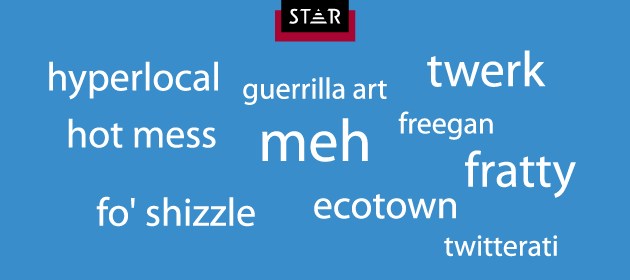
New Words in English Enter OED, 2015
OED, New Words in English Language
The OED, otherwise known as the Oxford English Dictionary, has recently announced 500 new words and over 900 newly revised and updated words that will be added.
Seems like there are so many that it’s almost impossible to imagine. However, many of the newly updated ones are new senses of the word, go, with about 603. Gosh! Although it’s 51 senses fewer than the longest OED entry, run, according to the OED itself.
One to make headlines though is twerk: a blend of of twitch or twist and jerk. Twitter almost exploded when it was revealed that twerk was, in fact, a pre-existing word — describing a dance that emphasizes the performer’s posterior, it has its roots in the early 1990s New Orleans ‘bounce’ music scene.
Even Older
Twerk goes back farther to its first possible usage in 1820 when it was spelled as twirk: referring to a twisting movement; a twitch. Then it reemerged in 1848 and again in 1901 when it was spelled the way we known it today. Its origin in unclear but the OED believe its influence is from quirk and work “in reference to the dance”.
What else is new?
We’ll cut to the chase and list ones already known, fo’ shizzle!
Along with guerrilla, that has already been established in the Dictionary here are some other phrases incorporating this compound word:
- guerrilla theatre (1966)
- guerrilla art (1970)
- guerrilla gardening (1973)
- guerrilla knitting (also known as yarn bombing or yarnstorming)
Then there’s that one we “slipped in” — fo’ shizzle (adjective), a slang term originated in the language of rap and hip-hop (2001) and means ‘for sure’.
Others:
- ecotown (noun): First recorded in 1974. Any new town designed to have a minimal impact on the environment and to facilitate an environmentally responsible lifestyle for everybody.
- freegan (noun): A person who eats discarded food, typically the refuse of shops and restaurants, for ethical or ecological reasons. It can also be used as an adjective and was first spotted in 1997.
- e-cigarette (noun): A cigarette-shaped device, first noted in 2007, containing a nicotine-based liquid that is vaporized and then inhaled; simulates the experience of smoking.
- voluntourism (noun): Tourism in which travellers spend time doing voluntary work on projects, usually for a charity. It was first recorded in 1991.
- hyperlocal (adjective): Extremely local; first used in 1900.
- meh (interjection): And interjection, expressing indifference or a lack of enthusiasm and popularized by The Simpsons, but already in use online by 1992 — two years before the series used it.
- hot mess (noun): A hot mess referred to ‘a warm meal, especially one served to a group’ in 1818, but it’s more commonly used as a slang term for something or someone in extreme confusion or disorder.
- lipstick (noun): In the world of darts, this is a slang term in use since 2003 for the treble twenty on a dartboard.
- fratty (adjective): Relating to a college fraternity; typical or characteristic of such a fraternity or its members, especially with reference to rowdy behaviour … has its origins in 1898.
- twitterati (noun): Users of the social networking service Twitter collectively, typically referring to the group of prolific contributors or those who have high numbers of followers. [2006]
- webisode (noun): A short video, especially an instalment in a drama or comedy series, which is presented online rather than being broadcast on television. And surprisingly dates back to 1996.
- SCOTUS (noun): An acronyms for (The) Supreme Court of the United States. [1879]
- FLOTUS (noun): An acronym for (The) First Lady of the United States. [1983]
Check out the OED’s other new entries such as cisgender and intersectionality, fo’ shizzle! OK — it’s out of my system now.
Graham,
